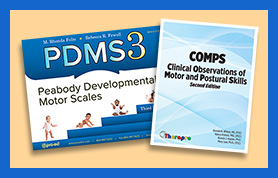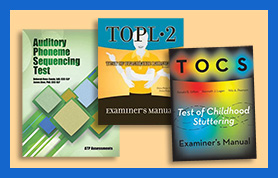|
|
Occupational therapy evaluations and occupational therapy assessments are important in determining a certain skill set or deficiency.
Sensory Processing
Sensory processing assessments measure the ability to register and accurately interpret sensory input in the environment and from the body. Early detection of sensory processing difficulties, in children, can prevent later learning difficulties.
Visual Processing
Assessments that measure visual processing evaluate visual discrimination, visual figure-ground discrimination, visual sequencing, visual-motor processing, visual memory, visual-spatial, visual closure, and letter and symbol reversal issues.
Developmental Assessments
Developmental assessments measure the ability of the child to meet the required developmental objectives and generally provide a picture of a child’s development in relation to same aged peers.
Gross Motor and Fine Motor
Gross motor assessments measure the ability to control the muscles of the body for large movements. Fine motor assessments measure the ability to use the fingers, hands, and wrists for manipulation and dexterity tasks.
Handwriting
Handwriting assessments may determine underlying causes contributing to handwriting difficulties or may provide an understanding of the aspects of handwriting that are negatively influencing handwriting legibility.
Speech
Speech assessments evaluate; articulation, phonology, and/ or fluency.
Language
Language assessments evaluate; expressive language, receptive language, and/ or social communication skills.
Augmentative and Alternative Communication
Augmentative and Alternative Communication evaluations assess an individual's communication abilities, needs, and preferences to determine the most effective and suitable AAC methods or devices for facilitating expressive and receptive communication.
Auditory Processing
Auditory Processing evaluations assess an individual's ability to process and interpret auditory information, including speech and other sounds, to identify any potential auditory processing disorders or deficits.
Feeding and Swallowing
Feeding and swallowing assessments evaluate areas that include swallowing, chewing, and/or the facia/throat structures that assist with feeding and swallowing.
Cognition and Intelligence
Cognitive ability tests assess abilities involved in thinking (e.g., reasoning, perception, memory, verbal and mathematical ability, and problem solving).
Behavior and Trauma
Behavior assessments are used to determine the type and severity of behavior related disorders. Trauma assessment can be used to identify victims of trauma, severity of trauma, and/or implications of one’s trauma history.
Autism
Autism assessments may be used to diagnose autism, rate the severity of autism, or measure the adaptive skills of a person with an autism diagnosis.
Academic Skills
Academic-focused Assessments may measure key academic skill areas including math and reading or may measure areas related to academic readiness.
Transition Planning
Transition planning inventories and profiles provide a systematic way to address transition planning that is mandated by IDEA 2004.
| |
|
|
|
|
|
|





















